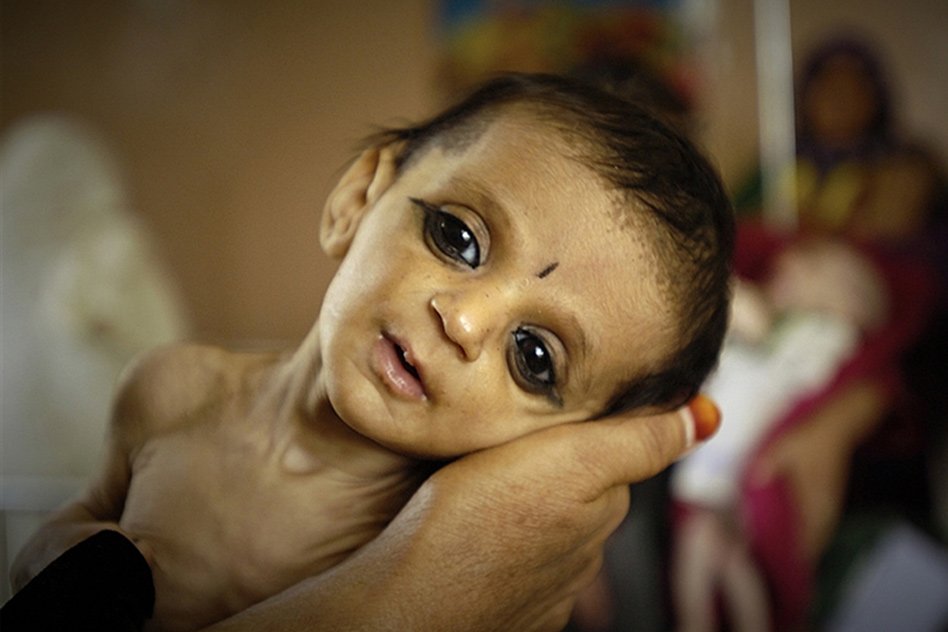Image Source : thedailyeye.info
It is a shocking irony that despite India’s ground-breaking leaps in economic growth, the country still leads in the world hunger list. As the country gears up for unprecedented reforms and projects, why does it continue to disappoint when it comes to combating malnutrition. Hunger has been a chronic issue afflicting the marginalised sections of society who are deprived of access to the bumper crops and surplus of grains. The surplus crops rot in the storage facilities while the malnourished population suffers from the careless organizational and distributional vision of the policy makers. The ‘Hunger of India’ is an unforgivable issue affecting the country which in the long run will fatally dent its long strides towards economic growth. The endemic issue of deprivation, food insecurity and malnutrition expose the grim truth that despite agriculture being a backbone of this country, it has been appallingly ignored. It is more shocking that government has either intentionally or by some gross error failed to provide appropriate subsidies to the agricultural sector. As India reeks under the crisis of Hunger in India-food stock rotting, farmers suicide, undistributed food supplies, government busy in politicising agriculture, it is about time the Right to Food is given immediate attention.
The Shocking Facts of the Hunger Neglect
The Global Hunger Index measures the growth of a country on three fundamental criteria: the proportion of calorie-deficient people, child malnutrition and child mortality. India ranks 55th on its scale which begs the question is India in fact a growing economic power when its people languish in hunger. The disadvantaged sections of the society- the Dalits, SC/STs and other BPL(below poverty line) households whose occupation is agriculture are chiefly hit hard by the inaccessibility of food, malnutrition and starvation. The expecting mothers and children who require proper nutrition have found to be severely undernourished, starved and underweight. This leads to higher risks of foetal mortality, anaemia and others serious diseases whose adverse effects are detrimental to the health and livelihood of the farmers and so on.
When more than half of the Indian population is incapacitated due to hunger, it immediately demands a prompt redress of the issue. Otherwise the economic growth of India will only remain an elite or superficial affair without touching the grassroots. Hunger should be considered relevant as economic growth if the first step towards hunger eradication is to take place.
India at a loss to combat Hunger: Why?
The parliament of India in order to provide subsidies food grains to the marginalised sections of society has enacted the National Food Security Act on September 12, 2013. This progressive step along with the food security programmes as Integrated Child Development Services scheme, Public Distribution System and Midday Meal Scheme highlight the attempts made by the government to generate a policy for combating hunger. However it is a long gap between policy making and put it into action. The very inadequacy to put words in to action suggests why India despite its rank as the next economic power is losing its people to malnutrition.
The bill can only procure a positive impact if its implementation is safeguarded from the corrupt practices of stealing what is meant for the poor, mismanaged distribution and storage of food, and lack of access to subsided food.
Yet another major contention with the implementation of Food Bill has been the disunited effort of the centre-state relation. They do not put away their political rivalries to enforce the bill with a concerted action. The political parties have rather adversely politicised the issue for gaining votes while seriously hampering the immediate focus and objective of the Food Bill. Due to this lack of coordination between the state and centre, the urgent requirements of storage places have been halted and that has led to rotting of food, wastage and hence hunger.
There have also been cases where the meals served in the Mid-day meals scheme have found to be contaminated, adulterated and lacking in the nutritional requirements of the body. This needs to be rectified as it is not only important to ensure food supply, but the assurance of nutrition is also indispensable.
How Hunger Impacts Economy
Hunger costs economy which in the long run, has a debilitating effect on the growth of a nation as a whole. It leads to illness which burdens the economy to pay for it. Marginalised sections of society due to their incapacity to work, study or pursue life goals are left out and cannot work to rake in the benefits of the modern India. Maternal and Child mortality rise. Farmer suicides are a common occurrence (as they are more burdened to work for themselves and for the country).
The Urban-Rural Hunger Gap
It is strange when we come to think of starvation. The concept is all too implausible to us, is it really happening in India? Food is a necessity which we are able to achieve on a regular basis. It also serves as a luxury as we dine in flamboyant restaurants and posh malls. We have pride, certainty and assurance to progress when India as a nation rises as a force to reckon with in the global market. This feeling of comfort, quality and security is however stolen and inaccessible to the marginalised section of India who reel in hunger when we consume daily meals as casually as one usually does. The issues as hunger, malnutrition and mortality seem to us as rare occurrences confined to some rural areas. Yet the reality is very shocking and exposes the deplorable conditions in which the majority of India’s population is living in. As India claims for a spot in the global arenas, it should not break its attention away from the foundation on which its economy will thrive.
The End Note: Hunger Kills
Urgency is key here. Collaboration and coordination between centre-state and public- private institutions is a must. Policies which manifest into action is paramount. Time to debate should be replaced by concrete implementation. It is imperative to highlight that Right to Food is not just a fine vision but a necessity to save the millions of Indians from the scourge of hunger.










